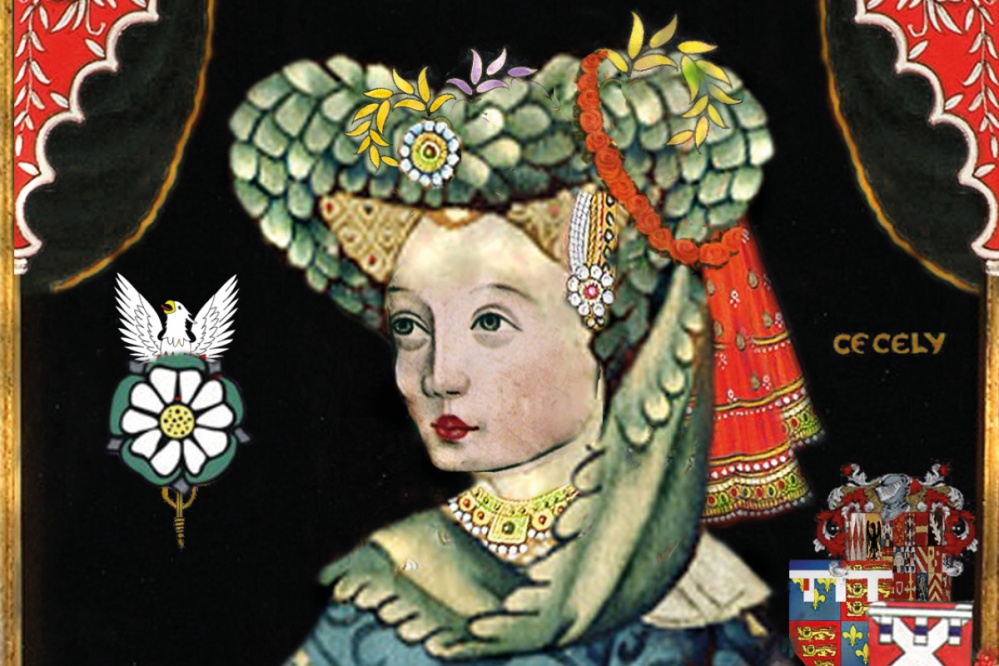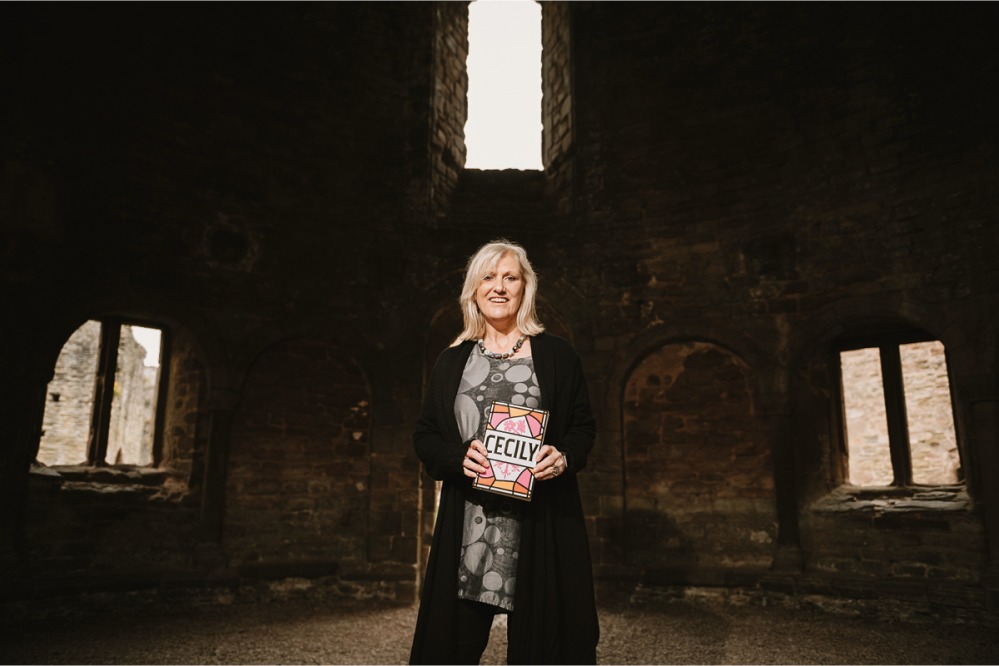This New Book on Raby's Cecily Neville is Breaking Stereotypes

From one inspirational woman to another
In the 15th century, Cecily, who was born and grew up in Raby Castle and was known as the ‘Rose of Raby’, was a political powerhouse. Her husband, Richard of York, 3rd Duke of York, was the leading contender for the throne of England during the Wars of the Roses up until his death in 1460, and Cecily was the mother of two kings (Edward IV and Richard III) – and the grandmother of a queen (Elizabeth of York). But Annie feels Cecily’s been unjustly side-lined by history. In a world where she believes more can still be done for gender equality, Annie has released a novel titled simply ‘Cecily’ to highlight the power this woman really had… and it’s been years in the making.
Annie has been drawn to Cecily ever since she was a child, encouraged by her mum’s love of historical fiction. ‘She and I used to read together all the time,’ Annie reminisces. ‘By the time I was about 10, I’d given up on children’s books altogether and I was just reading whatever she was reading – often Catherine Cookson.’ At The Manor, Annie’s school in Hartlepool, she had a deeply enthusiastic history teacher. ‘I think for him it was probably quite unusual to have a student who was actually into studying his subject, so he just kept giving me more and more books: history books and text books but novels as well,’ Annie explains. ‘I just devoured them all. He gave me a novel called We Speak No Treason which was about Richard III, Cecily’s famous son. I suppose looking back on it, it was quite a romantic book… I was 14 and I fell passionately in love with Richard III – he was my teenage crush. For me, in Hartlepool, Raby Castle was very close. It was one of those places that I used to go for days out as a child, at which point I didn’t know anything about Cecily. Richard III, before he became king, was Lord of the North, and all those great historic places like Middleham Castle, Barnard Castle and Richmond were my haunts throughout my childhood. I still go on pilgrimage there today. Oddly, now I’ve ended up living not too far from Ludlow Castle, Cecily and Richard’s family estate. You’re never very far from a piece of land that Cecily owned at one point or another. As I got older and became more interested in the women around Richard, rather than just him, I realised they were amazing women of their time. They were really larger than life characters.’
But the more Annie wanted to find out about these women, the less she could find – that especially goes for Cecily. ‘It just seemed like not much had been written, or said about her,’ she explains. ‘But when you looked into her life she was just fascinating.’ By the time Annie left university, she had her mind set on writing a novel. ‘I knew if I went into business then I could make a living, but there really wouldn’t be time for writing. So I made myself a promise that when I was 55 – whatever I was doing – I’d stop working and write this book.’ Annie stuck by that promise and began writing her book in 2017, when she turned 55, after signing up for a creative writing course.

Although Annie was passionate about this elusive woman, it wasn’t easy to research her past. ‘It was interesting because she’s so off the radar (there hadn’t been much written about her by novelists, and not by historians either) so for years and years to try to get an idea of who she was and what she was doing, I had to piece it all together,’ she explains. ‘That was massively frustrating for 30-odd years. Serendipitously, in 2017, just as I was settling down to write, historian and specialist in medieval women, Joanna Laynesmith, published a biography of Cecily and that was hugely helpful to me. She and I became good friends, and she’s helped me a lot.
‘The thing that fascinated me the most about Cecily was that she lived for so long (80 years) and for most of that time she was one of the most, if not the most, powerful woman in England. She was never far from the beating heart of political power, and very close to the throne. It was 80 of the most tumultuous years in English history. I think people have a misconception about women in the middle ages; fiction and film have encouraged us to think that they just sat around doing their tapestry waiting for a knight in shining armour to ride along, and the greatest thing that could fulfil them in life was romance. That’s just so far from the truth. For higher status, aristocratic women like Cecily, the things that they were responsible for (and the people who took orders from them), are not dissimilar from running a midsize company today. There was very little time for sitting around and doing your embroidery,’ Annie laughs. ‘These were women of business. They often ran huge estates. They were highly literate, they understood law, understood politics, they were very involved in their husband’s careers and they were managing and manipulating their family’s relationships in complex hierarchies.’
When Annie was working, she began to notice more parallels between Cecily and women today. ‘I’d often find myself to be the only woman at the big table with all the blokes,’ she reflects. ‘I thought, gosh, I’m learning now the things that Cecily knew and understood more than 500 years ago – how to get things done in a world where men have all the power, and how to assume power when it isn’t actually being given to you.’ That was reaffirmed at a book event a few weeks ago. ‘A woman came up to me and said that she was an officer in the army and that she found the book fascinating because Cecily used all the techniques to get men to do stuff that she herself uses in her own job role. Flatter them, make it think it’s their idea, flirt a bit… it’s amazing what you can get done,’ Annie laughs.
When Cecily’s son Edward IV became king but had to go north, he left her holding the reins of power. London was a hot bed of rumour and the ambassadors of Europe were watching it unfold. There are some letters from the ambassadors to their foreign courts at that time, and there’s one in particular which Annie loved. ‘I paraphrase but basically it says “right, England, it looks like Edward’s won. He’s king. People love him like he’s a god. But if we want to do business in England, we need to do it with his mother”. He was still a boy at the time but Cecily was a seasoned mover and shaker. You can just imagine her taking control. I love the idea of debunking the myth of medieval women being powerless. Women like Cecily had buckets of agency.’
While being an inspiration for career-focused women, Cecily is also a great example of how medieval women had to face the work-life balance that many still struggle with today. ‘One thing you were expected to do is breed (and if you didn’t nothing much else mattered),’ Annie says. ‘You had to have kids, and preferably sons. The disappointment if you didn’t was intense. Cecily will have been under intense pressure to deliver a son. We’re still, as women, trying to balance how to be good mothers and how to have our own careers now. I think women today need these stories and we need to give these stories to our daughters.
‘We are at a point now, along the road of female emancipation, where we are being told we can do anything, we can have whatever want. That’s wonderful, but it’s sort of scary because, unlike for men, we don’t have many blueprints from women who’ve done that in the past because those voices have been hidden. I mention a book that Isabella of Portugal gives to Cecily called The Book of the City of Ladies. That’s an actual book written by a female scholar (there’s a rare thing in the 15th century). She wrote it as a way of looking back at the lives of women in classical history, her history, and bringing their voices back. She wrote that as a response to the misogyny and chauvinism at the time. Here we are still having to do the same thing. It’s sort of wonderful, but it’s sort of sad too.’
When asked how it feels to finally have her book published after all these years, Annie says she still expects to wake up and discover that it’s all been a dream. ‘People keep saying that a film should be made of this and I’m thinking, what shall I wear to the Oscars,’ she laughs. ‘I don’t know… that is so in the lap of the gods. The fact that it’s been published is a miracle enough – the idea of a film or TV deal would be incredible but there’s no rumour of that at the moment.’ But story to screen aside, Annie is already writing a sequel. ‘This book ends in 1461 and Cecily lives until 1495 and there’s a lot more action in that latter part of her life, with the Wars of the Roses, the rise of Richard III and eventually the Tudors.’
Cecily is published by Viking Penguin, costs £14.99, and is available in hardback, e-book and audio formats.







